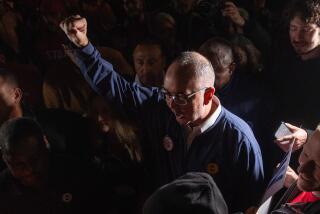PROPOSED DEAL FOR UNITED AIRLINES : Most Employees Hoping for End to the Turbulence : Airlines: The UAL buyout was good news for some, not so good for others. But many workers say they are just plain tired.
- Share via
United Airlines employees sounded more like tired workers Friday than like future owners of beleaguered UAL Corp., the nation’s second-largest air carrier.
Optimism was mixed with disillusionment among those interviewed at Los Angeles and Chicago airports. And, most of all, pilots, flight attendants and machinists said they want their long ordeal to be over.
“I wish we could go back to before this started, back to when we were a good airline,” said one flight attendant who has worked for United for 25 years.
UAL announced Friday that its directors have agreed to sell the Chicago-based company to its employees for $4.38 billion in cash, notes and securities. Unions representing pilots, flight attendants and machinists have agreed to pay an estimated $201 a share, composed of $155 in cash, $35 of UAL debt and an estimated $11 worth of stock in a UAL subsidiary.
The transaction could mean the end of months of uncertainty and turmoil for UAL and its 71,285 employees, with rumors, bids, counter bids, failed offers and a threatened proxy battle having plagued the company.
At Los Angeles International Airport and O’Hare International Airport in Chicago, many UAL workers were searching for information on the buyout. “Right now, it’s mostly rumors,” said Joseph Santoro, a lead ramp service machinist in Chicago.
The majority of men and women wearing United wings preferred to say nothing or to speak only on condition that they remain anonymous--some for fear of retaliation and some simply out of worry about jinxing the deal.
The agreement was good news to flight attendant Jan McKinney, who has had her fill of airline troubles. McKinney has been with United only one year--after 10 years with Frontier Airlines, which filed for bankruptcy protection in 1986.
“They went bankrupt on my day off,” McKinney said. “I came to United, and I’ll be glad when all this stuff is settled.
“I’m real excited about it,” added McKinney, who was heading for a flight out of Los Angeles.
“I’m optimistic, too,” said her co-worker, Sue Srimongkol.
Said United pilot George E. Zimmer, who had just completed a flight to Chicago from New York’s LaGuardia Airport: “It’s long term. Now we know we have a job.”
Under the agreement, the unions will give concessions on wages and benefits worth $2 billion over the next five years.
New York-based flight attendant Susan Bichel said she has no idea what kinds of changes to expect in her paycheck but hopes there will be a valuable trade-off. “I think we’ll have more security,” she said.
But not everyone was flying high.
“We’re getting shafted,” flight attendant Peter Basile said in Los Angeles, referring to the concessions. “I’m not happy about it, but at this point we don’t have an option. Somebody else would come in and sell off the assets.”
One Los Angeles pilot noted that the employee group has not yet arranged financing, has no equity in the company yet and has not named a potential management team. “The hardest part is yet to go,” he said.
“The CEO is going to go,” the pilot said, referring to Stephen M. Wolf, UAL’s current chairman and chief executive. “How are we going to get financing with an unproven CEO?”
Some employees said a worker-owned United could be a better-run company if pride of ownership pushed employees and management to put aside their differences. All three unions are currently working without contracts.
“Hopefully, it will instill in everybody the desire to do a better job,” said pilot Chuck Brockway in Los Angeles. “With everybody involved, we can all try to work together and get along.”
Not all union members are certain that employee ownership is the best answer.
“I used to wonder if this is the best choice. . . . I’m hopeful,” said flight attendant Natalie Sneed, who has been with United for only six months.
Sneed said she once hoped that a buyer would take over “and put more money into the company and make the situation better all around. . . . I think we’re certainly going to try, but it’s limited.”
Bichel does not agree that employee ownership will hinder United’s success. “I see us as a leader,” she said. “After the loan’s paid off, the sky’s the limit.”
But for many interviewed Friday, their greatest hope was for an end to the turbulence they have weathered for more than a year.
“I have 13 years with the company, and I don’t want to come in one day and find out there’s nothing left,” said a Los Angeles-based flight attendant. “Trust me, it’s been a long haul.”
Nancy Rivera Brooks reported from Los Angeles and Tracy Shryer from Chicago.
MAIN STORY, A1
More to Read
Inside the business of entertainment
The Wide Shot brings you news, analysis and insights on everything from streaming wars to production — and what it all means for the future.
You may occasionally receive promotional content from the Los Angeles Times.










